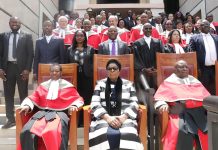Africa-Press – Namibia. THE ministry of mines and energy received a tongue lashing from the parliamentary standing committee on natural resources over the conduct of the Canadian oil company ReconAfrica, which is currently drilling for oil in the Kavango East region.
The ministry was summoned to appear before the committee after receiving a petition from an alliance of local and international civil society organisations, scientists and activists, on 24 February.
ReconAfrica was granted a drilling permit in August 2020 and began drilling in December.
The committee says some of the initiatives being publicised by ReconAfrica don’t represent the harsh realities faced by citizens of the Kavango East region. The committee also accused the energy ministry of prioritising revenue from tax and royalties, which does not directly benefit locals.
Statistics from the energy ministry indicate that the government has so far received N$7,6 million as a result of ReconAfrica entering the market. It also received N$12,2 million for the renewal period and an additional N$5,3 million which went into the Petroleum Training and Education Fund (Petrofund).
Committee chairperson Tjekero Tweya says they’ve established that people’s livelihoods and crop production have been affected to make way for ReconAfrica’s operations.
“The community is asking how they [residents of the Kavango East region] will directly benefit? Because it’s only the government that is benefiting through royalties and taxes.”
The energy ministry says 250 Namibians have been employed by ReconAfrica, while the company maintains that it has employed over 300 Namibians.
When hiring, ReconAfrica says it will first look at employing those in the constituency, then the region and finally, nationwide.
“The reality on the ground does not reflect that. We found some professionals that are not from there,” says Tweya.
The committee also expressed dismay at how ReconAfrica allegedly bypassed the traditional authorities in their dealings with community members, which Tweya says must be addressed.
“The traditional leadership is ignored and when questions are asked they are told that the order came from Windhoek,” he says. “’You don’t do that. The officials from the ministry of mines and energy were there, yet they never advised ReconAfrica to do the right thing.”
The committee further questioned why ReconAfrica owns 90% of the project, while the government, through the National Petroleum Corporation of Namibia (Namcor), only owns 10%.
Tweya says these resources should be extracted but only on Namibian terms.
“That’s where the energy ministry comes in, the oil should be processed here in Namibia, instead of taking it out and making us buy our own refined products back at a cost 10 times higher.”
“If that’s the law, we are lawmakers and we are ready to fix it so that the resources don’t become a curse. It must be a blessing, from rural areas to central towns,” he says.
Petroleum commissioner Maggy Shino admitted that the energy ministry doesn’t have a tangible policy on corporate social responsibility.
“What should companies do apart from what we have already prescribed to them in the petroleum agreement? What else can they do in order to leave a meaningful impact on the community?”
Shino says they are aware that ReconAfrica drilled boreholes and helped some schools in the area but that the company must do more to leave a long-lasting footprint.
Executive director in the energy ministry Simeon Negumbo says the ministry of mines is busy reviewing the law, a process they expect to finalise next year. He says some of the issues raised by the committee are core to the question of how local people can benefit more without scaring investors away.
“Our mandate is a bit tricky; one is to attract investments, the second is to make sure that Namibians benefit from their own resources. Our task is to see the balance between the two. We will look into it when we are finalising the review of the law.”
ReconAfrica spokesperson Ndapewoshali Shapwanale told The Namibian last week that the company is employing best practices throughout its operations.
“Our local hire and procurement approach has significantly contributed to the economy of the two regions,” she says.






